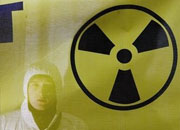However, despite nuclear power production in Germany coming to an end, the risk of nuclear accidents remains due to the ageing reactor fleet in neighbouring countries and previously “unthinkable” threats such as sabotage or war-related damage to reactors in Ukraine, Lemke said. The renewable power industry welcomed the nuclear exit’s completion, stating that wind and solar power are ready to replace the reactors, whereas a survey suggests most people in the country appear to be sceptical whether the energy system is ready to run without them.
The three remaining nuclear plants in Germany will be shut down for good on 15 April, following a three-month extension granted in the context of the European energy crisis, environment minister Steffi Lemke confirmed to journalists in Berlin.
“The technology’s era is over” in the country, Lemke said, arguing that this will make Germany a safer place and put a stop to generating nuclear waste. Germany’s energy security will not be jeopardised by the decommissioning of the three plants, Isar 2 and Neckarwestheim 2 in southern Germany and Emsland in the north, Lemke said.
The country has managed to restructure its gas supply following the loss of Russia as a trade partner, which has been the main cause of the energy crisis, and would replace the capacity of the outgoing reactors with new renewable power installations and gas-fired power stations, said Lemke. Power exports to nuclear power state France reached record levels during the energy crisis, which underlined the fact that nuclear plants do not automatically provide a safeguard in crisis situations, she said.
Completing the nuclear exit in Germany had originally been planned for the end of 2022, but the war in Ukraine and its repercussions had led parliament to decide a limited runtime extension to support the power system and allow Germany and neighbouring countries to ensure supply security. Opposition politicians from the conservative Christian Democrats (CDU) and from the government coalition party Free Democrats (FDP) had repeatedly advocated for further extending the plants’ runtime. However, chancellor Olaf Scholz’s government ultimately restricted the extension to mid-April.
.jpg)
The Neckarwestheim plant in southern Germany is among the last reactors that are shut down in April 2023. Photo: EnBW
Ageing nuclear plants are one of the greatest risks in Europe
Fully dismantling the roughly 30 plants in the country and deciding on a long-term nuclear waste storage solution are tasks that will take several decades, the Green Party minister said. “These tasks will be a challenge in the next few years,” Lemke said. Nuclear power has been used in Germany for 60 years and it’s now clear that it is “a high-risk technology that ultimately cannot be fully controlled.” Three generations have benefitted from nuclear power use in Germany, but about 30,000 generations will be affected by the ongoing presence of nuclear waste, she argued. Finding a final repository, especially for highly radioactive waste, will now be “a very difficult but unavoidable” task.
At the same time the risk of nuclear accidents would not be completely unavoidable, Lemke added. Ageing reactors in the immediate neighbourhood, sabotage of energy infrastructure and the “previously unthinkable” scenario of reactors operating in an active warzone, such as the Zaporizhzhia plant in Ukraine, continue to pose real danger for people in Germany and elsewhere in Europe, she stressed. “Ageing nuclear plants are one of the greatest risks in Europe,” Lemke said, but stressed that every country had the right to decide on the technology’s use on its own territory.
Inge Paulini, head of the Federal Office for Radiation Protection (BfS), pointed out that seven reactors abroad currently operate within less than 100 kilometres from the German border, which means they still pose a direct threat to the population. “Germany’s nuclear phase-out doesn’t mean all risk is gone,” Paulini said, arguing that the need for an effective and state-of-the-art radiation protection programme had not been forgotten in the country.
The German Renewable Energy Federation (BEE) commented that the nuclear exit’s completion is a step that is both “feasible and necessary” from the energy industry’s perspective. Beyond the immediate risk of nuclear accidents, new plants simply could not compete economically with renewable power and are too inflexible in their use to serve as a capacity backup to iron out fluctuations in renewable power generation, BEE head Simone Peter said.“We cannot afford inflexibility on the power market as the share of renewable energy is growing,” she argued, adding that more nuclear power ultimately meant blocking renewable expansion. “Nuclear power has become expendable and that’s good news. Renewable power will take it from here,” said Peter.
In a recent poll by broadcaster RTL, the majority of respondents was less certain about the ability of renewable energy to carry the entire power system alone. In a survey carried out by pollster Forsa, only ten percent said renewable power like wind and solar would be able to support the power system alone "for the foreseeable future", whereas 88 percent were sceptical of that being the case. The question in the survey did not further define the timeframe.
Even among voters of the Green Party, which has been most committed to a fast phase-out, only about 18 percent responded renewable energy would be able to guarantee a stable electricity system alone. By contrast, 57 percent of all respondents said that nuclear power should still be used.
.jpg)


